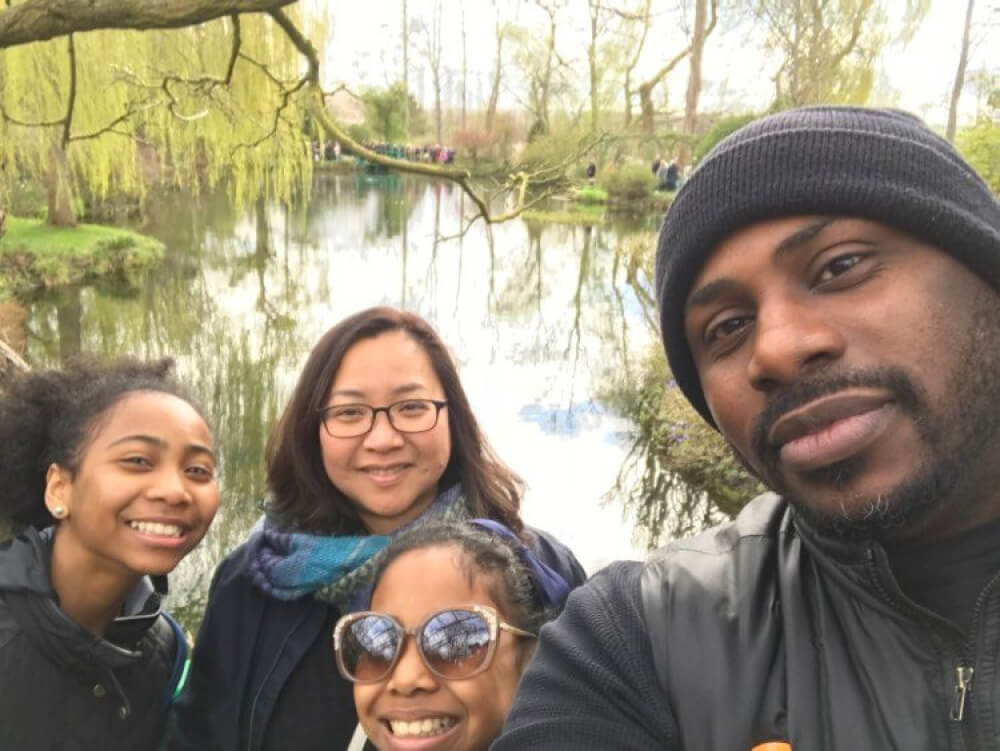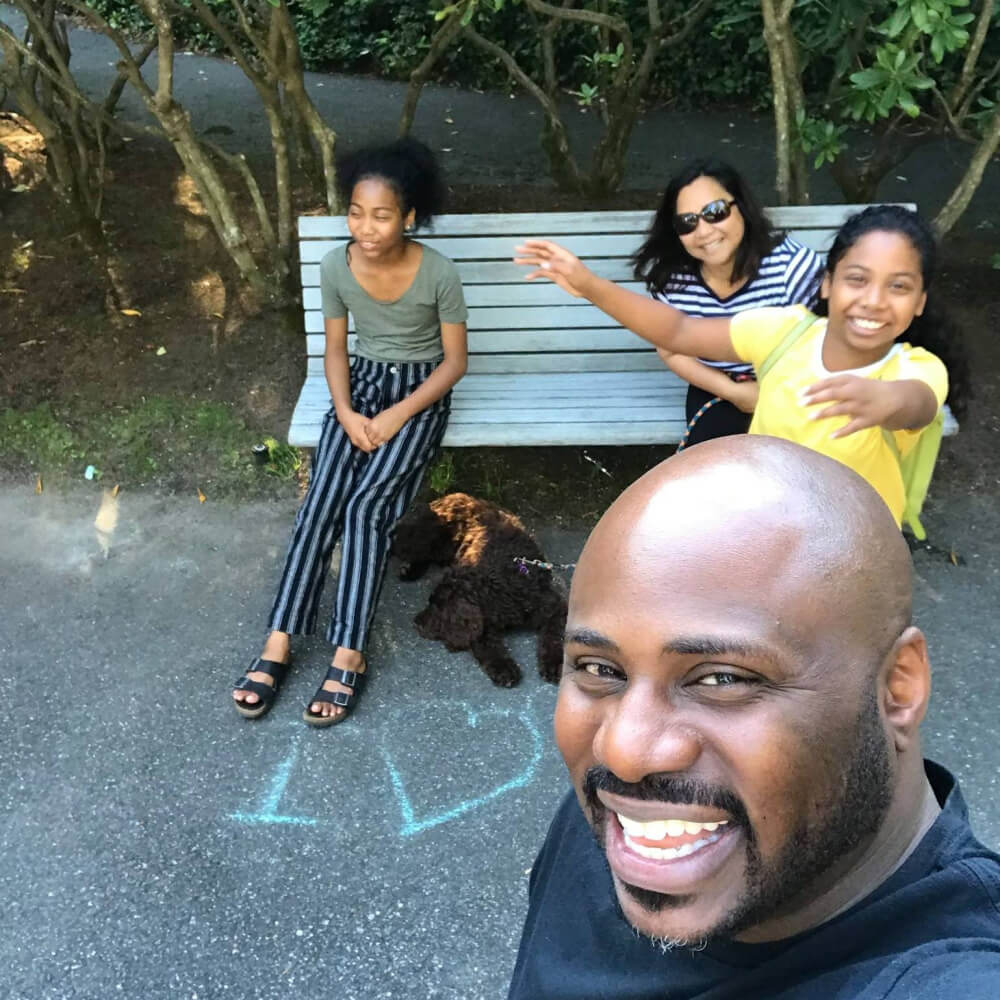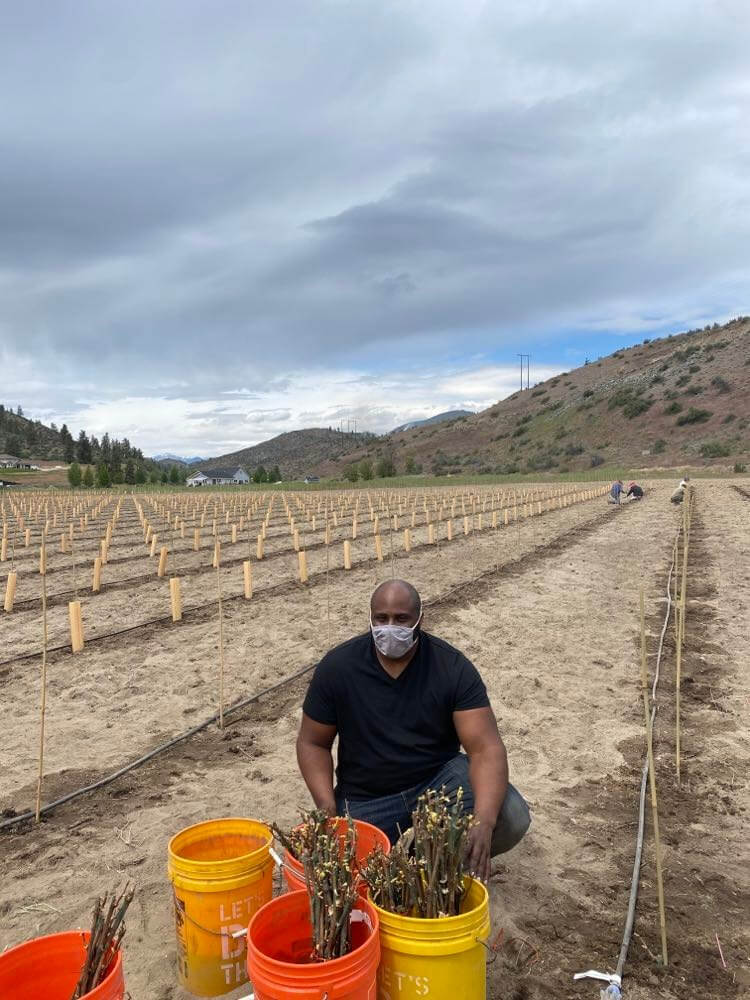At 43, Erick Eigner was leading a healthy and fulfilling life: spending time with family, working in marketing at Microsoft, and hitting the gym six days a week. Cancer was the last thing he was thinking about when he went to the doctor for a physical and mentioned some concerns he had about swallowing.
The problem was that food was getting stuck in Eigner’s throat. To evaluate his esophagus, Eigner’s provider offered an endoscopy, and even though swallowing isn’t an indication of colon cancer, they also offered a colonoscopy. Since Eigner was close to the colorectal cancer screening age (45 years old), his care team felt they should get it out of the way.
“It was offered like no big deal; they said they’d just do both while I was already under anesthesia to get it out of the way, but that nothing would turn up, probably,” he says.
When Eigner came to after the colonoscopy, his gastroenterologist informed him that he had found polyps in Eigner’s intestines. Polyps are abnormal growth tissues that are usually benign but can become cancerous.
“I was sort of in shock, and was still asking about my throat, but my doctor said to me, ‘We should really focus on this colon thing first,’” Eigner recalls.
Bloodwork, CT scans, and a biopsy confirmed that he had stage III colon cancer, a diagnosis that would eventually lead him to the experts at the Young-Onset Colorectal Cancer Center at Dana-Farber Brigham Cancer Center.
“Get your colonoscopy. Do not wait,” he says. “I’ve been telling that to all of my friends lately.”
[Learn more: When should I have my first colorectal cancer screening?]

The challenges of treatment
Although his cancer was treatable and Eigner had access to quality care in Seattle, Wash., his journey through chemotherapy was difficult. Having been extremely active at work, at home with two teenage children, and in the gym powerlifting prior to the cancer diagnosis, it was challenging for him to slow down for treatment.
During chemotherapy, he rapidly lost the strength that he built up in the gym, going from being able to deadlift 575 pounds to no longer being able to complete a pull-up.
“I wasn’t expecting that,” he says. “That was really hard.”
With time away from work and unable to sit still for very long, Eigner poured his energies into a new hobby: a vineyard. More accurately, the beginnings of one. Eigner bought a plot of land, and with the help of a hired team, began to cultivate a crop of grapes.
“I don’t drink, but that 10-acre piece of land is my creative outlet,” he says. “I just want it to be a beautiful and peaceful place.”
Eigner also had to navigate the difficult subject of cancer with his children. He realized that, out of concern, they were doing research online that led them to worrying conclusions.
“I really had to take them aside and tell them to come to me if they had questions,” he says. “Don’t try to solve this on your own online.”
He also describes a feeling of isolation; though his family was a source of support for him throughout chemotherapy, he also felt a responsibility to be the support structure in his family even during treatment.
“There is nothing like this experience on a physical and emotional front,” Eigner says. “The people that know what I’m going through are going to know how I’m feeling.”
These struggles are similar to others that deal with young onset colorectal cancer. That’s why the Young-Onset Colorectal Cancer Center at Dana-Farber Brigham Cancer Center, the only one of its kind in the United States, offer peer-to-peer support groups that helps patients navigate parenting, employment, and the health care system.

Coming to Dana-Farber
The effects of chemotherapy, and the stress of a possible recurrence as his treatment wound down, led Eigner to seek out resources catered to patients like him.
“I had this lingering question about what I can do to keep this cancer from coming back,” Eigner says.
He wanted to give himself the best shot at a long and healthy life so that he could be there for his family.
“It’s not really the getting sick that hurts the most,” he explains. “It’s the thought of not being able to get to love the ones that you love the most.”
Eigner spent weeks researching and eventually found his way to Kimmie Ng, MD, MPH, of the Young-Onset Colorectal Cancer Center. The Center focuses exclusively on the care of colorectal cancer patients under the age of 50. As part of the Colon and Rectal Cancer Center at Dana-Farber Brigham Cancer Center, the center’s specialists provide expert care and support throughout all phases of diagnosis, treatment, and survivorship, knowing that young adults face unique challenges when diagnosed with colorectal cancer.
Eigner found Ng’s research-backed approach to young-onset colorectal cancer (YOCC) extremely compelling, especially as it related to changes he could make to reduce the risk of recurrence.
“It felt like Dr. Ng was the only person who understood this problem that I was having,” Eigner says. “I was willing to make changes to my life to stay healthy. I just needed to know what they were.”
After flying from Seattle, Eigner met with Ng in person, and they discussed what he could do to reduce the risk of recurrence. It was recommended that he maintain a healthy weight, continue exercising several days a week, and reduce red meat, as well as fried and processed foods and sugar-sweetened beverages (e.g., elements of a “Western pattern diet”), from his diet.
“I eat nuts everyday now too,” he laughs. “I never used to eat nuts.” Studies have shown that consumption of nuts is associated with reduced risk of cancer.

“My only line of defense is leading a healthy lifestyle and following Dr. Ng’s recommendations,” he adds. “That’s why her research is so important. I want to live my next 30 to 40 years living in the right way.”
“One of the hardest things about a cancer diagnosis is the loss of control,” says Ng. “Because following a healthy diet and lifestyle is something that a patient can control to help improve their outcomes, it is absolutely critical to conduct rigorous epidemiological and translational research to identify the healthy behaviors that are associated with a reduced risk of recurrence and longer survival.
“I am glad that we were able to share the results of our work with Erick and make data-driven recommendations to help him enter survivorship,” Ng continues. “The Young-Onset Colorectal Cancer Center at Dana-Farber is one of the only places in the world that focuses on diet and lifestyle research and offers unique resources to support young patients like Erick.”
Looking to a healthy future, Eigner is excited to get back to work, back into the gym, and of course, out onto his vineyard.

Excellent article. I was treated for stage 2b colon cancer at Dana Faber in 2013. I’m eight-six years old recently had hopefully last colonoscopy. Thank God for Dana Fabre and excellent staff.
All the best to you Erick! You got this